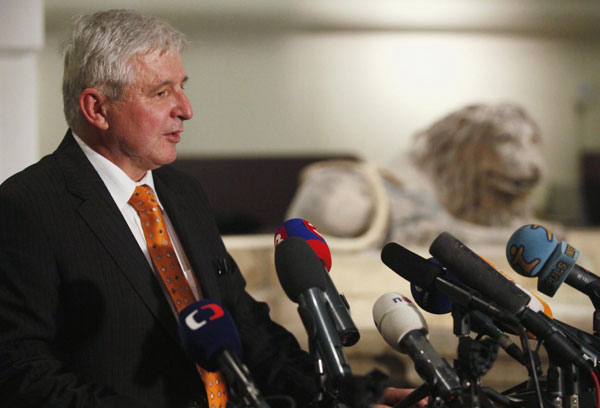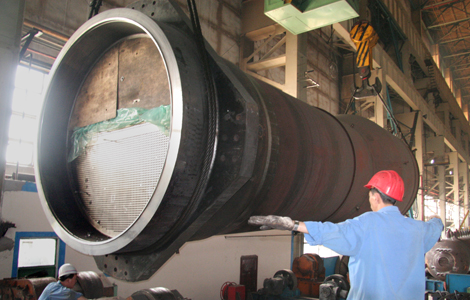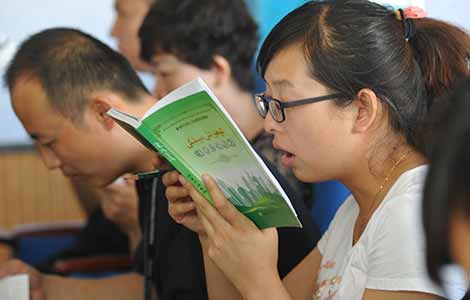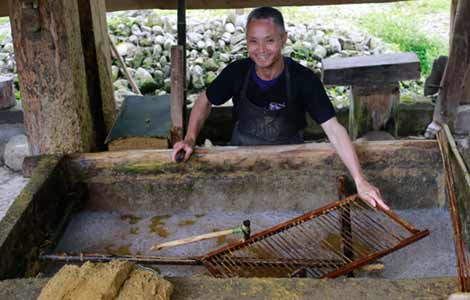Czech cabinet loses confidence vote, PM to resign
Updated: 2013-08-08 13:10
(Xinhua)
|
||||||||
 |
|
Czech Prime Minister Jiri Rusnok addresses the media after the new Czech cabinet lost a parliamentary vote of confidence in Prague August 7, 2013. [Photo/Agencies] |
PRAGUE - The Czech cabinet led by Prime Minister Jiri Rusnok failed to win a vote of confidence in parliament on Wednesday and Rusnok said he would resign on Thursday or Friday.
According to media reports, there were 93 votes in favor of and 100 votes against the new cabinet appointed by President Milos Zeman last month.
"Our government will of course hand in its resignation to the president according to the constitutional order and I suppose that we will continue fulfilling the basic functions of the country's administration according to his instructions, in other words to guarantee the operation of individual ministries," Rusnok said.
"We'll see how fast the Chamber of Deputies will work towards its own dissolution. This will naturally influence our further steps," he said.
Rusnok said it was good that the result of the vote was going to contribute to a relative quick dissolution of the lower house. He said that this result was favorable for the Czech political scene.
The vote resulted in a completely unexpected outcome in the form of early elections.
The previous government, which held a majority of 101 votes, saw two of its members opt to abstain rather than support their coalition. This completely undermined the strategy of Miroslava Nemcova, the coalition's nominee for prime minister, and ultimately forced the issue of early elections.
Nemcova and Miroslav Kalousek, the leader of TOP09, said that if they did not have 101 votes to form a government, they would rather have early elections than allow the caretaker government to continue.
The president has said he will allow the caretaker government to rule "in demise" until the next elections, despite its loss in the vote of confidence. This is allowed by a quirk in the constitution that gives the president no time limit by which he must name a new government if the first option fails.
In the end, the government won the support of the three opposition parties. Public Affairs (VV) seemed to be clearly offering its support from the beginning, and the Communist Party (KSCM) seemed open to offering it with some reservations.
The largest party in the House of Representatives, the Social Democratic Party (CSSD), however, seemed unlikely to offer its whole-hearted support until the final moments, when its leader Bohuslav Sobotka capitulated to pressure from within his party.
The newly-formed National Socialist party, led by CSSD's former leader Jiri Paroubek, joined the coalition parties in the vote against the government. Paroubek even gave a speech in which he said that the president did not properly understand the Constitution.
This was enough to thwart Rusnok's chance of succeeding in the vote of confidence, but the loss of the 101 votes was a major blow to the coalition, which ultimately led to the decision to vote for new elections.
Zeman gave a passionate speech just before the vote of confidence, but it was not enough to convince the chamber to vote for the government. He said that the government of Petr Necas, the previous prime minister, had seen its public support reach historical lows, which was why he wanted to quickly replace it.
He did not attain his wish of a successful vote for the caretaker government, but he successfully prevented the return of the previous government, which he has often said was part of his mandate from the presidential elections.
CSSD leader Bohuslav Sobotka is perhaps the biggest winner out of Wednesday's unpredictable turn of events.
He has been arguing for early elections since the beginning of the political crisis, and this outcome gives him a strong chance of soon becoming the next prime minister of the Czech Republic.
Most Viewed
Editor's Picks

|

|

|

|

|

|
Today's Top News
China's innovation prowess looms large
US, EU concerned about stalemate in Egypt
EU to continue anti-subsidy solar probe
Nation poised to import more GMO products
Illegal Shanghai stay costs foreigner 10,000 yuan
China to be leading business travel market
Cards make paying global tuition easier
Probes not targeting foreign brands
US Weekly

|

|












